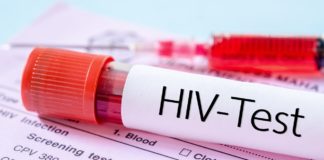
Chemsex is on the rise in Asia despite the risks of harsh punishment and getting HIV, according to a new report.
The report published on Tuesday by Harm Reduction International, a global drug health organisation, said that chemsex – where gay men take a mix of potent drugs to enhance group sex – and wider sex-related drug use among gay men is increasing in countries including Thailand, Vietnam, Taiwan, Malaysia, Indonesia, the Philippines, Hong Kong, China, and Japan.
Advertisement
It said a rising number of gay men, especially young men living in cities in the region, known for its tough drug laws, have been involved in either chemsex or other types of sexualised drug use among men who have sex with each other. Experts believe the rise is due to an increase in the use of dating apps and social media communities, as well as wider drug supply in Asia.
Although the double stigma of being gay and taking illegal drugs in Asia makes it hard for researchers to get accurate figures, estimates from nine countries in the region suggest chemsex is more common than previously thought. For example, in Hong Kong and Malaysia more than one in 10 gay men interviewed had experienced chemsex in the last six months, while in Indonesia, China and Japan more than one in five had been involved in more general sexualised drug use.
“What’s important to note is that chemsex in Asia is happening against a backdrop of punitive drug regimes and in many instances, negative attitudes towards both drugs and gay sex,” Gideon Lasco, one of the report’s authors, told VICE World News. “Those who engage in chemsex in the region are less likely to access health and harm reduction services, and are more likely to face harsh penalties as a result of their chemsex practices.” In the Philippines a police raid on a “orgy” led to the illegal disclosure of a suspect’s HIV status during a press conference.
Advertisement
Chemsex usually involves men having sex with each other at house parties arranged on dating apps while getting high on three main drugs – crystal methamphetamine (“ice”), which is typically injected, GHB and mephedrone. The niche scene began in the US and UK before expanding and spreading more widely across Europe and now Asia, where the sex drugs of choice are meth, ecstasy, poppers and ketamine.
Doctors in Thailand have noted a rise from four percent to 20 percent of those engaged in chemsex who were injecting meth. Over COVID lockdowns, when bars and clubs closed, experts in Thailand said they had witnessed a rise in chemsex. In May last year during lockdown police raided a Bangkok sauna and arrested 62 men, all young locals, for being involved in a “chemsex party”.
“The rise in dating and messaging apps and anonymous communities on Twitter, changing socio-economic dynamics in the city, as well as the availability of the substances have contributed to the rise of chemsex in the region,” said Lasco. “Anecdotally, we hear that the COVID pandemic with its flexible work arrangements has made chemsex parties more frequent in some cities like Bangkok and Manila.”
Advertisement
The report warned chemsex has strong links with sexual risk behaviours that contribute to the increased risk of HIV transmission. In the region, research has found people involved in chemsex are twice as likely to have HIV than those who are not. The report called for a “robust response” from health and drug agencies in Asian countries to respond to the trend. It said traditional harm reduction services, such as those geared towards heroin or meth addiction, were not geared up to help those engaged in chemsex because it is a relatively new phenomenon.
Thailand’s chemsex scene is one of “pleasure, secrecy and risk” according to a study into “ice parties” carried out by researchers at Mahidol University. But it was not as fraternal as it seemed. “On the surface, participants described ice parties as exclusive, in trend, luxurious, fun and pleasurable – a kind of modern camaraderie among beautiful men,” said the researchers. “In reality, however, this group phenomenon was a social hierarchy containing several important players with relational power to one another, to the ice itself and to the physical space where ice was being consumed. These players included ice suppliers, party hosts, party guests and ice-tenders.”
In response to the problem, the report noted that initiatives to help men who take part in chemsex parties are already being set up in some parts of Asia.
APCOM, a Thailand-based NGO which aims to improve the health rights of gay men in the region, has developed community initiatives in Bangkok,Ho Chi Minh City, Manila and Jakarta, which encourage men involved in chemsex to get tested for HIV and to access HIV services. In Taiwan, Min-Sheng Hospital in Kaohsiung City supports the HERO (Healing, Empowerment and Recovery from Chemsex) clinic, a health and social service for men who engage in chemsex.








